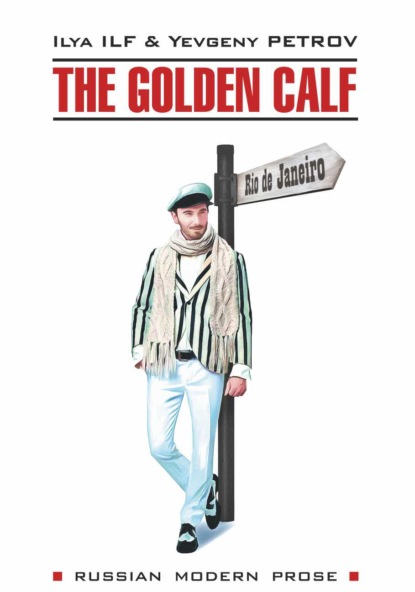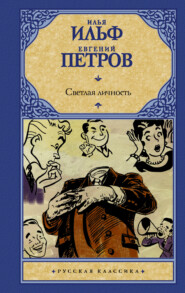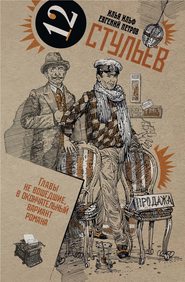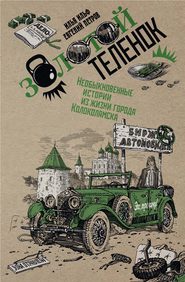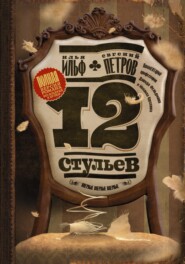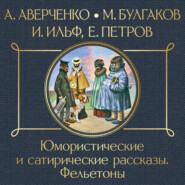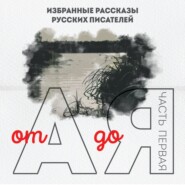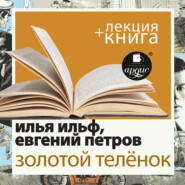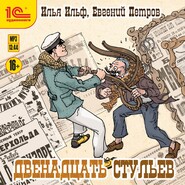По всем вопросам обращайтесь на: info@litportal.ru
(©) 2003-2024.
✖
Золотой теленок / The Golden Calf
Автор
Жанр
Серия
Год написания книги
1931
Теги
Настройки чтения
Размер шрифта
Высота строк
Поля
Ostap took off his summer cap, waved it in the air, and asked:
“Do I have any gray hair?”
Balaganov sucked in his stomach, spread his feet to the width of a rifle butt, and boomed like a soldier:
“No, Sir!”
“I will. Great battles await us. Your hair, Balaganov, will turn gray too.”
Balaganov suddenly giggled childishly:
“How did you put it? He’ll bring the money himself on a platter with a blue rim?”
“A platter for me,” said Ostap, “and a small plate for you.”
“But what about Rio de Janeiro? I want white pants too.”
“Rio de Janeiro is the cherished dream of my youth,” said the grand strategist seriously, “keep your paws off it. Now back to business. Send the forward guards to my command. Troops are to report to the city of Chernomorsk asap. Full dress uniform. Start the music! I am commanding the parade!”
Chapter 3. Gas is yours, ideas ours
A year before Panikovsky violated the pact by trespassing on someone else’s territory, the first automobile appeared in the town of Arbatov. The town’s trailblazing automotive pioneer was a motorist by the name of Kozlevich. It was his decision to start a new life that brought him to the steering wheel.
The old life of Adam Kozlevich was sinful.
He repeatedly violated the Criminal Code of the Russian Socialist Republic, specifically Article 162, which deals with the misappropriation of another person’s property (theft). This article has many sections, but sinful Adam had no interest in Section A (theft committed without the use of technical devices). That was too primitive for him. Section E, which carried the penalty of incarceration for up to five years, did not suit him either. He didn’t want to spend too much time in prison. Having been interested in all things technical since he was a child, Kozlevich devoted his energies to Article C (felonious misappropriation of another person’s property committed with the use of technical devices, or repeatedly, or in collusion with other individuals, at train stations, in ports, on boats, on trains, or in hotels).
But Kozlevich had very bad luck. He was caught whether he utilized his beloved technical devices or made do without them. He was caught at train stations, in ports, on boats, and in hotels. He was also caught on trains. He was caught even when, in total despair, he resorted to grabbing property in collusion with other individuals.
After a total of about three years in jail, Adam Kozlevich decided that it was much better to accumulate your own property honestly and overtly than to take it from others covertly. This decision brought peace to his restless soul. He became a model inmate, published denunciatory poems in the prison newsletter, Day In and Day Out, and worked hard in the machine shop. The penitentiary system had a salutary effect on him. Adam Kazimirovich Kozlevich, 46, single, of peasant origin, of the former Czestochowa District, multiple repeat offender, came out of prison an honest man.
After two years of working in a Moscow garage, he bought a used car; it was so ancient that its appearance on the market could only be explained by the closing of an automotive museum. Kozlevich paid 190 rubles for this curiosity. For some reason, the car came with a fake palm tree in a green pot. He had to buy the palm tree as well. The tree was passable, but the car needed plenty of work. He searched flea markets for missing parts, patched up the seats, replaced the entire electric system, and, as a final touch, painted the car bright lizard green. The car’s breed was impossible to determine, but Adam claimed it was a Lorraine-Dietrich. As proof of that, he attached a brass plate with the Lorraine-Dietrich logo to the radiator. He was ready to start a private taxi business, which had been Adam’s dream for quite some time.
The day when Adam introduced his creation to the public at a taxi stand was a sad day for private taxi drivers. One hundred and twenty small, black Renault taxicabs, that looked like Browning pistols, were introduced to the streets of Moscow by the authorities. Kozlevich didn’t even attempt to compete with them. He put the palm tree in the Versailles cabdrivers’ tearoom, for safekeeping, and went to work in the provinces.
Arbatov, which totally lacked automotive transport, was much to his liking, so he decided to stay there for good.
Kozlevich imagined how hard, cheerfully, and, above all, honestly he would toil in the field of cabs for hire. He pictured himself on early arctic-cold mornings, waiting at the station for the train from Moscow. Wrapped in a thick ruddy-colored fur coat, his aviator goggles raised to his forehead, he jovially offers cigarettes to the porters. Somewhere behind him, the freezing coachmen are huddling. They cry from the cold and shiver in their thick dark-blue capes. And then the station bell begins to ring. It’s a sign that the train has arrived. Passengers walk out onto the station square and stop in front of the car, pleasantly surprised. They didn’t think that the idea of the taxi had reached the boondocks of Arbatov. Sounding the horn, Kozlevich whisks his passengers to the Peasants’ Hostel. There’s enough work for the whole day, and everyone is happy to take advantage of his services. Kozlevich and his faithful Lorraine-Dietrich invariably participate in all of the town’s weddings, sightseeing trips, and other special occasions. Summers are particularly busy. On Sundays, whole families go to the country in Adam’s car. Children laugh foolishly, scarves and ribbons flutter in the wind, women chatter merrily, fathers look at the driver’s leather-clad back with respect and ask him about automotive developments in the United States of North America. For example, is it true that Ford buys himself a new car every day?
That’s how Kozlevich pictured his blissful new life in Arbatov. The reality, however, quickly destroyed Adam’s castle in the air, with all its turrets, drawbridges, weathervanes, and standards.
The first blow was inflicted by the train schedule. Fast trains passed through Arbatov without making a stop, picking up single line tokens and dropping express mail on the move. Slow trains arrived only twice a week. For the most part, they only brought insignificant people: peasants and shoemakers with knapsacks, boot trees, and petitions to the local authorities. As a rule, these people did not use taxis. There were no sightseeing trips or special occasions, and nobody hired Kozlevich for weddings. People in Arbatov were accustomed to using horse-drawn carriages for weddings. On such occasions, the coachmen would braid paper roses and chrysanthemums into the horses’ manes. The older men, who were in charge of the festivities, loved it.
On the other hand, there were plenty of outings, but those were very different from the ones Adam had pictured. No children, no fluttering scarves, no merry chatter.
On the very first evening, when the dim kerosene street lamps were already lit, Adam was approached by four men. He had spent the whole day pointlessly waiting on Holy Cooperative Square. The men stared at the car for a long time without saying a word. Then one of them, a hunchback, asked uncertainly:
“Can anybody take a ride?”
“Yes, anybody,” replied Kozlevich, surprised by the timidity of the citizens of Arbatov.
“Five rubles an hour.”
The men whispered among themselves. The chauffeur heard some strange sighs and a few words: “Why don’t we do it after the meeting, Comrades…? Would that be appropriate…? One twenty-five per person is not too much… Why would it be inappropriate…?”
And so for the first time, the spacious car took a few locals into its upholstered lap. For a few minutes, the passengers were silent, overwhelmed by the speed, the smell of gasoline, and the whistling wind. Then, as if having a vague premonition, they started quietly singing: “The time of our lives, it’s fast as waves…” Kozlevich shifted into third gear. The sombre silhouette of a boarded-up roadside stand flew by, and the car tore out into the fields on the moonlit highway.
“Every day brings the grave ever closer to us,” crooned the passengers plaintively. They felt sorry for themselves, sorry that they had never gone to university and had never sung student songs. They belted out the chorus rather loudly:
“Let’s have a glass, a little one, tra-la-la-la, tra-la-la-la.”
“Stop!” shouted the hunchback suddenly. “Turn around! I can’t take it any more!”
Back in town, the riders picked up a large number of bottles that were filled with clear liquid, as well as a broad-shouldered woman from somewhere. Out in the fields, they set up a picnic, ate dinner with vodka, and danced the polka without music.
Exhausted from the night’s adventures, Kozlevich spent the next day dozing off behind the wheel at his stand. Towards evening, the same gang showed up, already tipsy. They climbed into the car and drove like mad through the fields surrounding the city all night long. The third night saw a repeat of the whole thing. The nighttime feasts of the fun-loving gang, headed by the hunchback, went on for two weeks in a row. The joys of automotive recreation affected Adam’s clients in a most peculiar way: in the dark, their pale and swollen faces resembled pillows. The hunchback, with a piece of sausage hanging from his mouth, looked like a vampire.
They grew anxious and, at the height of the fun, occasionally wept. One night, the adventurous hunchback arrived at the taxi stand in a horse-drawn carriage with a big sack of rice. At sunrise, they took the rice to a village, swapped it for moonshine, and didn’t bother going back to the city. They sat on haystacks and drank with the peasants, hugging them and swearing eternal friendship. At night, they set up bonfires and wept more pitifully than ever.
The following morning was gray and dull, and the railroad-affiliated Lineman Co-op closed for inventory. The hunchback was its director, his fun-loving friends members of the board and the control commission. The auditors were bitterly disappointed to discover that the store had no flour, no pepper, no coarse soap, no water troughs, no textiles, and no rice. The shelves, the counters, the boxes, and the barrels had all been completely emptied. A pair of enormous hip boots, size fifteen with yellow glued-leather soles, towered in the middle of the store. A National cash register, its lady-like nickel-plated bosom covered with numerous keys, sat in a glass booth. That was all that was left. Kozlevich, for his part, received a subpoena from a police detective; the driver was wanted as a witness in the case of the Lineman Co-op.
The hunchback and his friends never showed up again, and the green car stood idle for three days.
All subsequent passengers, like the first bunch, would appear under the cover of darkness. They would also start with an innocent drive to the country, but their thoughts would turn to vodka after the first half-mile. Apparently, the people of Arbatov could not imagine staying sober in an automobile. They clearly regarded Adam’s vehicle as a refuge for sinful pleasures, where one ought to behave recklessly, make loud obscene noises, and generally live one’s life to the fullest.
Kozlevich finally understood why the men who walked past his stand during the day winked at one another and smiled wryly.
Things were very different from what Adam had envisioned. At night, he was whizzing past the woods with his headlights on, listening to the passengers’ drunken fussing and hollering behind him. During the day, in a stupor from lack of sleep, he sat in detectives’ offices giving statements. For some reason, the citizens of Arbatov paid for their high living with money that belonged to the state, society, or the co-ops. Against his will, Kozlevich was once again deeply entangled with the Criminal code, this time its Part III, the part that informatively discusses white-collar crimes.
The trials soon commenced. In all of them, the main witness for the prosecution was Adam Kozlevich. His truthful accounts knocked the defendants off their feet, and they confessed everything, choking on tears and snot. He ruined countless organizations. His last victim was a branch of the regional film studio, which was shooting a historical movie, Stenka Razin and the Princess, in Arbatov. The entire staff of the branch was locked up for six years, while the film, which was of legal interest only, joined the pirate boots from the Lineman Co-op at the material evidence exhibit.
After that, Adam’s business crashed. People avoided the green vehicle like the plague. They made wide circles around Holy Cooperative Square, where Kozlevich had erected a tall sign: AUTOMOBILE FOR HIRE. He earned nothing at all for several months and lived off the savings from earlier nocturnal rides.
Then he had to make a few sacrifices. He painted a white sign on the car’s door that said LET’S RIDE! and lowered the fare from five to three rubles an hour. The sign looked rather enticing to him, but people resisted anyway. He would drive slowly around town, approaching office buildings and yelling into open windows:
“The air is so fresh! Why not go for a ride?”
Officials would stick their heads out and yell back over the clatter of the Underwood typewriters:
“Go take a ride yourself, you hangman!”
“Hangman?” Kozlevich asked, on the verge of tears.
“Of course you are,” answered the officials, “you’d put us all in the slammer.”
“Then why don’t you pay with your own money?” asked the driver. “For the rides?”
At this point the officials would exchange funny looks and shut the windows. They thought it was ridiculous to use their own money to pay for car rides.
“Do I have any gray hair?”
Balaganov sucked in his stomach, spread his feet to the width of a rifle butt, and boomed like a soldier:
“No, Sir!”
“I will. Great battles await us. Your hair, Balaganov, will turn gray too.”
Balaganov suddenly giggled childishly:
“How did you put it? He’ll bring the money himself on a platter with a blue rim?”
“A platter for me,” said Ostap, “and a small plate for you.”
“But what about Rio de Janeiro? I want white pants too.”
“Rio de Janeiro is the cherished dream of my youth,” said the grand strategist seriously, “keep your paws off it. Now back to business. Send the forward guards to my command. Troops are to report to the city of Chernomorsk asap. Full dress uniform. Start the music! I am commanding the parade!”
Chapter 3. Gas is yours, ideas ours
A year before Panikovsky violated the pact by trespassing on someone else’s territory, the first automobile appeared in the town of Arbatov. The town’s trailblazing automotive pioneer was a motorist by the name of Kozlevich. It was his decision to start a new life that brought him to the steering wheel.
The old life of Adam Kozlevich was sinful.
He repeatedly violated the Criminal Code of the Russian Socialist Republic, specifically Article 162, which deals with the misappropriation of another person’s property (theft). This article has many sections, but sinful Adam had no interest in Section A (theft committed without the use of technical devices). That was too primitive for him. Section E, which carried the penalty of incarceration for up to five years, did not suit him either. He didn’t want to spend too much time in prison. Having been interested in all things technical since he was a child, Kozlevich devoted his energies to Article C (felonious misappropriation of another person’s property committed with the use of technical devices, or repeatedly, or in collusion with other individuals, at train stations, in ports, on boats, on trains, or in hotels).
But Kozlevich had very bad luck. He was caught whether he utilized his beloved technical devices or made do without them. He was caught at train stations, in ports, on boats, and in hotels. He was also caught on trains. He was caught even when, in total despair, he resorted to grabbing property in collusion with other individuals.
After a total of about three years in jail, Adam Kozlevich decided that it was much better to accumulate your own property honestly and overtly than to take it from others covertly. This decision brought peace to his restless soul. He became a model inmate, published denunciatory poems in the prison newsletter, Day In and Day Out, and worked hard in the machine shop. The penitentiary system had a salutary effect on him. Adam Kazimirovich Kozlevich, 46, single, of peasant origin, of the former Czestochowa District, multiple repeat offender, came out of prison an honest man.
After two years of working in a Moscow garage, he bought a used car; it was so ancient that its appearance on the market could only be explained by the closing of an automotive museum. Kozlevich paid 190 rubles for this curiosity. For some reason, the car came with a fake palm tree in a green pot. He had to buy the palm tree as well. The tree was passable, but the car needed plenty of work. He searched flea markets for missing parts, patched up the seats, replaced the entire electric system, and, as a final touch, painted the car bright lizard green. The car’s breed was impossible to determine, but Adam claimed it was a Lorraine-Dietrich. As proof of that, he attached a brass plate with the Lorraine-Dietrich logo to the radiator. He was ready to start a private taxi business, which had been Adam’s dream for quite some time.
The day when Adam introduced his creation to the public at a taxi stand was a sad day for private taxi drivers. One hundred and twenty small, black Renault taxicabs, that looked like Browning pistols, were introduced to the streets of Moscow by the authorities. Kozlevich didn’t even attempt to compete with them. He put the palm tree in the Versailles cabdrivers’ tearoom, for safekeeping, and went to work in the provinces.
Arbatov, which totally lacked automotive transport, was much to his liking, so he decided to stay there for good.
Kozlevich imagined how hard, cheerfully, and, above all, honestly he would toil in the field of cabs for hire. He pictured himself on early arctic-cold mornings, waiting at the station for the train from Moscow. Wrapped in a thick ruddy-colored fur coat, his aviator goggles raised to his forehead, he jovially offers cigarettes to the porters. Somewhere behind him, the freezing coachmen are huddling. They cry from the cold and shiver in their thick dark-blue capes. And then the station bell begins to ring. It’s a sign that the train has arrived. Passengers walk out onto the station square and stop in front of the car, pleasantly surprised. They didn’t think that the idea of the taxi had reached the boondocks of Arbatov. Sounding the horn, Kozlevich whisks his passengers to the Peasants’ Hostel. There’s enough work for the whole day, and everyone is happy to take advantage of his services. Kozlevich and his faithful Lorraine-Dietrich invariably participate in all of the town’s weddings, sightseeing trips, and other special occasions. Summers are particularly busy. On Sundays, whole families go to the country in Adam’s car. Children laugh foolishly, scarves and ribbons flutter in the wind, women chatter merrily, fathers look at the driver’s leather-clad back with respect and ask him about automotive developments in the United States of North America. For example, is it true that Ford buys himself a new car every day?
That’s how Kozlevich pictured his blissful new life in Arbatov. The reality, however, quickly destroyed Adam’s castle in the air, with all its turrets, drawbridges, weathervanes, and standards.
The first blow was inflicted by the train schedule. Fast trains passed through Arbatov without making a stop, picking up single line tokens and dropping express mail on the move. Slow trains arrived only twice a week. For the most part, they only brought insignificant people: peasants and shoemakers with knapsacks, boot trees, and petitions to the local authorities. As a rule, these people did not use taxis. There were no sightseeing trips or special occasions, and nobody hired Kozlevich for weddings. People in Arbatov were accustomed to using horse-drawn carriages for weddings. On such occasions, the coachmen would braid paper roses and chrysanthemums into the horses’ manes. The older men, who were in charge of the festivities, loved it.
On the other hand, there were plenty of outings, but those were very different from the ones Adam had pictured. No children, no fluttering scarves, no merry chatter.
On the very first evening, when the dim kerosene street lamps were already lit, Adam was approached by four men. He had spent the whole day pointlessly waiting on Holy Cooperative Square. The men stared at the car for a long time without saying a word. Then one of them, a hunchback, asked uncertainly:
“Can anybody take a ride?”
“Yes, anybody,” replied Kozlevich, surprised by the timidity of the citizens of Arbatov.
“Five rubles an hour.”
The men whispered among themselves. The chauffeur heard some strange sighs and a few words: “Why don’t we do it after the meeting, Comrades…? Would that be appropriate…? One twenty-five per person is not too much… Why would it be inappropriate…?”
And so for the first time, the spacious car took a few locals into its upholstered lap. For a few minutes, the passengers were silent, overwhelmed by the speed, the smell of gasoline, and the whistling wind. Then, as if having a vague premonition, they started quietly singing: “The time of our lives, it’s fast as waves…” Kozlevich shifted into third gear. The sombre silhouette of a boarded-up roadside stand flew by, and the car tore out into the fields on the moonlit highway.
“Every day brings the grave ever closer to us,” crooned the passengers plaintively. They felt sorry for themselves, sorry that they had never gone to university and had never sung student songs. They belted out the chorus rather loudly:
“Let’s have a glass, a little one, tra-la-la-la, tra-la-la-la.”
“Stop!” shouted the hunchback suddenly. “Turn around! I can’t take it any more!”
Back in town, the riders picked up a large number of bottles that were filled with clear liquid, as well as a broad-shouldered woman from somewhere. Out in the fields, they set up a picnic, ate dinner with vodka, and danced the polka without music.
Exhausted from the night’s adventures, Kozlevich spent the next day dozing off behind the wheel at his stand. Towards evening, the same gang showed up, already tipsy. They climbed into the car and drove like mad through the fields surrounding the city all night long. The third night saw a repeat of the whole thing. The nighttime feasts of the fun-loving gang, headed by the hunchback, went on for two weeks in a row. The joys of automotive recreation affected Adam’s clients in a most peculiar way: in the dark, their pale and swollen faces resembled pillows. The hunchback, with a piece of sausage hanging from his mouth, looked like a vampire.
They grew anxious and, at the height of the fun, occasionally wept. One night, the adventurous hunchback arrived at the taxi stand in a horse-drawn carriage with a big sack of rice. At sunrise, they took the rice to a village, swapped it for moonshine, and didn’t bother going back to the city. They sat on haystacks and drank with the peasants, hugging them and swearing eternal friendship. At night, they set up bonfires and wept more pitifully than ever.
The following morning was gray and dull, and the railroad-affiliated Lineman Co-op closed for inventory. The hunchback was its director, his fun-loving friends members of the board and the control commission. The auditors were bitterly disappointed to discover that the store had no flour, no pepper, no coarse soap, no water troughs, no textiles, and no rice. The shelves, the counters, the boxes, and the barrels had all been completely emptied. A pair of enormous hip boots, size fifteen with yellow glued-leather soles, towered in the middle of the store. A National cash register, its lady-like nickel-plated bosom covered with numerous keys, sat in a glass booth. That was all that was left. Kozlevich, for his part, received a subpoena from a police detective; the driver was wanted as a witness in the case of the Lineman Co-op.
The hunchback and his friends never showed up again, and the green car stood idle for three days.
All subsequent passengers, like the first bunch, would appear under the cover of darkness. They would also start with an innocent drive to the country, but their thoughts would turn to vodka after the first half-mile. Apparently, the people of Arbatov could not imagine staying sober in an automobile. They clearly regarded Adam’s vehicle as a refuge for sinful pleasures, where one ought to behave recklessly, make loud obscene noises, and generally live one’s life to the fullest.
Kozlevich finally understood why the men who walked past his stand during the day winked at one another and smiled wryly.
Things were very different from what Adam had envisioned. At night, he was whizzing past the woods with his headlights on, listening to the passengers’ drunken fussing and hollering behind him. During the day, in a stupor from lack of sleep, he sat in detectives’ offices giving statements. For some reason, the citizens of Arbatov paid for their high living with money that belonged to the state, society, or the co-ops. Against his will, Kozlevich was once again deeply entangled with the Criminal code, this time its Part III, the part that informatively discusses white-collar crimes.
The trials soon commenced. In all of them, the main witness for the prosecution was Adam Kozlevich. His truthful accounts knocked the defendants off their feet, and they confessed everything, choking on tears and snot. He ruined countless organizations. His last victim was a branch of the regional film studio, which was shooting a historical movie, Stenka Razin and the Princess, in Arbatov. The entire staff of the branch was locked up for six years, while the film, which was of legal interest only, joined the pirate boots from the Lineman Co-op at the material evidence exhibit.
After that, Adam’s business crashed. People avoided the green vehicle like the plague. They made wide circles around Holy Cooperative Square, where Kozlevich had erected a tall sign: AUTOMOBILE FOR HIRE. He earned nothing at all for several months and lived off the savings from earlier nocturnal rides.
Then he had to make a few sacrifices. He painted a white sign on the car’s door that said LET’S RIDE! and lowered the fare from five to three rubles an hour. The sign looked rather enticing to him, but people resisted anyway. He would drive slowly around town, approaching office buildings and yelling into open windows:
“The air is so fresh! Why not go for a ride?”
Officials would stick their heads out and yell back over the clatter of the Underwood typewriters:
“Go take a ride yourself, you hangman!”
“Hangman?” Kozlevich asked, on the verge of tears.
“Of course you are,” answered the officials, “you’d put us all in the slammer.”
“Then why don’t you pay with your own money?” asked the driver. “For the rides?”
At this point the officials would exchange funny looks and shut the windows. They thought it was ridiculous to use their own money to pay for car rides.





